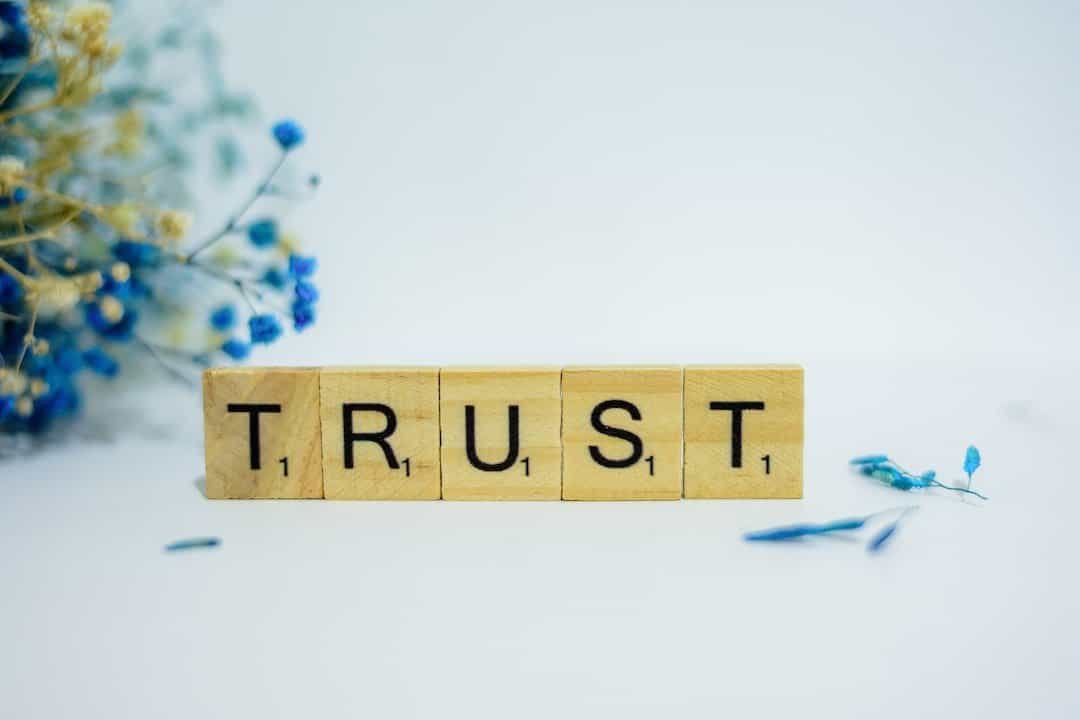How To Foster Trust In Personal And Professional Relationships
Are you looking to build stronger relationships both personally and professionally? Research shows that 90% of individuals believe that trust is a key factor in successful relationships.
It’s no surprise then, that fostering trust is essential for creating healthy connections with others. Whether it’s with your spouse, family, friends, or colleagues, trust forms the foundation upon which all relationships are built.
In this article, we will explore practical strategies for building and maintaining trust in personal and professional relationships. By understanding the importance of trust and implementing these techniques into your interactions, you can create a solid framework for meaningful connections.
From open communication to consistent actions, we will delve into the benefits of building trust and how it can positively impact your life.
So let’s get started on this journey towards stronger and more fulfilling relationships!
Key Takeaways
- Building trust is essential for both personal and professional relationships.
- Trust can be fostered through vulnerability, active listening, and open communication.
- Consistency, reliability, and delivering on commitments are key factors in building trust.
- Maintaining confidentiality, demonstrating competence and professionalism, and acting with integrity contribute to building trust.
Building Trust in Personal Relationships
If you want to build trust in your personal relationships, you need to open up and share your deepest fears and insecurities with the people who matter most to you. Building trust is a two-way street, and vulnerability plays a crucial role in strengthening connections. By letting others see your vulnerabilities, you show them that you trust them enough to be completely honest. This can create an environment of openness and understanding, fostering deeper connections and building trust.
Another important aspect of building trust in personal relationships is active listening. When someone confides in you or shares their fears, it’s essential to provide them with your full attention. Show empathy by acknowledging their feelings and validating their experiences. Avoid judgment or jumping to conclusions; instead, focus on truly understanding what they’re going through. Active listening helps create a safe space where individuals feel heard and valued, further strengthening the bond of trust between both parties.
Lastly, consistency is key when it comes to building trust in personal relationships. Be reliable and follow through on your commitments. When others can depend on you consistently, they’ll begin to see that they can rely on you not only during good times but also during challenging moments. Consistency builds confidence in the reliability of the relationship, making it easier for both parties to open up without fear of betrayal or disappointment.
Building trust requires opening up and sharing vulnerabilities with those closest to us. It involves active listening, empathy, and providing a safe space for others to express themselves freely without judgment. Additionally, being consistent in our actions cultivates confidence in the reliability of our relationships. By incorporating these practices into our interactions with loved ones, we can strengthen connections and foster deep levels of trust that’ll endure over time, creating a strong support system that can weather any storm and bring immense happiness and fulfillment to all involved.
Fostering Trust in Professional Relationships
When fostering trust in professional relationships, it’s essential to deliver on your commitments consistently. This means following through on your promises and meeting deadlines.
Additionally, maintaining confidentiality is crucial for building trust with colleagues and clients. Respecting their privacy and keeping sensitive information confidential will demonstrate your professionalism and reliability.
Finally, demonstrating competence and professionalism in your work is key to gaining trust from others. Showcasing your skills, knowledge, and dedication will give others confidence in your abilities and build a strong foundation of trust in the professional relationship.
Delivering on Commitments
By consistently fulfilling our promises, we can cultivate a sense of reliability and dependability, nurturing trust in both personal and professional relationships.
Meeting expectations is crucial in building trust with others. When you make a commitment to someone, whether it’s delivering a project by a certain deadline or showing up to a meeting on time, it’s important to follow through. Being accountable for your actions demonstrates that you value the other person’s time and effort. It shows that you take your commitments seriously and that you’re reliable.
In order to deliver on commitments, it’s essential to set realistic expectations from the beginning. Make sure you fully understand what’s being asked of you before agreeing to anything. It’s better to underpromise and overdeliver than the other way around. Communicate openly and honestly about any potential challenges or obstacles that may arise along the way. This not only allows for better planning but also builds trust as it shows transparency and integrity.
Remember, actions speak louder than words when it comes to building trust in personal and professional relationships. So, make sure you consistently meet your commitments and hold yourself accountable for your actions.
Maintaining Confidentiality
Ensuring confidentiality is vital for preserving the trust and confidence of others, allowing for a secure and respectful environment.
Confidentiality breaches can have severe consequences, leading to trust erosion and damaging personal and professional relationships.
When someone shares sensitive information with you, it’s important to honor their trust by keeping it confidential.
Recognize that divulging this information without permission not only violates their privacy but also undermines the foundation of trust upon which your relationship is built.
By maintaining confidentiality, you demonstrate respect for the other person’s boundaries and show that you can be trusted with sensitive information.
To maintain confidentiality effectively, it’s crucial to establish clear guidelines from the start.
Make sure both parties understand the expectations regarding what should remain confidential and what can be shared openly.
It’s also essential to create a safe space where individuals feel comfortable sharing their thoughts and concerns without fear of judgment or exposure.
Regularly reminding yourself about the importance of confidentiality will help reinforce your commitment to upholding it in personal and professional interactions.
Respecting confidentiality plays a significant role in fostering trust in personal and professional relationships.
Breaching someone’s trust by revealing confidential information can lead to erosion of trust, which may take time to rebuild.
By consistently honoring confidentiality agreements, setting clear expectations, and creating a safe environment for open communication, you can contribute towards building strong relationships based on mutual respect and trust.
Demonstrating Competence and Professionalism
Exuding confidence and professionalism in your interactions can leave a lasting impression that resonates with others. When you demonstrate expertise and establish credibility, you not only gain the trust of those around you but also inspire them to have confidence in your abilities.
One way to demonstrate competence is by staying up-to-date on industry trends and advancements. By continuously expanding your knowledge and skills, you show others that you’re dedicated to your profession and are capable of delivering high-quality work.
Another important aspect of demonstrating competence is being able to communicate effectively. Clearly conveying your ideas and thoughts allows others to understand the depth of your expertise. Additionally, actively listening to others’ perspectives shows that you value their input and respect their knowledge.
To further establish credibility, it’s essential to maintain a professional demeanor at all times. This includes being punctual for meetings or appointments, dressing appropriately for the occasion, and conducting yourself with integrity. Consistently acting in a professional manner builds trust because it demonstrates reliability and dependability.
Incorporating these practices into your personal and professional relationships will help foster trust among those around you. Demonstrating expertise through continuous learning, effective communication, maintaining professionalism, and acting with integrity will not only enhance your own reputation but also encourage others to place their trust in you.
The Importance of Trust in Relationships
To foster trust in personal and professional relationships, it’s crucial that you understand the importance of trust.
Building trust in friendships and earning trust in the workplace are essential for creating strong and meaningful connections with others.
In personal relationships, trust forms the foundation of any healthy friendship. When you demonstrate reliability, honesty, and loyalty to your friends, you build a sense of trust that allows them to feel safe and secure in your presence. Trust is not something that can be demanded or forced; it must be earned through consistent actions over time.
By being there for your friends when they need you, keeping their secrets confidential, and following through on your commitments, you show them that they can rely on you. This creates a deep bond built on mutual respect and understanding.
Similarly, trust plays a vital role in professional relationships as well. In the workplace, trusting your colleagues and superiors is crucial for effective collaboration and productivity. When people have confidence in each other’s abilities and intentions, they are more likely to work together efficiently towards shared goals.
Trust also fosters open communication and encourages employees to take risks without fear of judgment or retribution. As an individual striving to earn trust in the workplace, it’s important to demonstrate competence by delivering high-quality work consistently. Additionally, showing professionalism through punctuality, meeting deadlines, and respecting confidentiality helps establish credibility among your peers.
Recognizing the significance of trust is essential for fostering strong personal and professional relationships. Building trust in friendships involves demonstrating reliability, honesty, loyalty over time while earning trust at work requires displaying competence and professionalism consistently. By prioritizing these qualities in your interactions with others both personally and professionally, you lay the groundwork for long-lasting connections based on mutual respect and understanding.
Strategies for Building and Maintaining Trust
Building and maintaining trust requires consistent effort and a genuine commitment to understanding and supporting others.
When it comes to building trust in friendships, it’s important to be reliable, honest, and respectful. Show up for your friends when they need you, be transparent in your communication, and treat them with kindness and consideration.
Trust is built over time through shared experiences, so make an effort to spend quality time together, listen actively to their concerns, and offer support when they’re going through tough times.
In romantic relationships, trust is even more crucial. It forms the foundation of a healthy partnership. To build trust with your partner, prioritize open and honest communication. Share your thoughts and feelings openly without fear of judgment or criticism. Be dependable by following through on your promises and commitments. Avoid keeping secrets or lying as this can erode trust quickly.
It’s also important to remember that building trust takes time and patience. Be willing to forgive mistakes and give second chances when necessary. Trust is not built overnight but rather through consistent actions over a period of time.
By demonstrating reliability, honesty, respect, and open communication in both friendships and romantic relationships, you can foster trust that will strengthen these connections in the long run.
The Benefits of Trust in Personal and Professional Relationships
In personal and professional relationships, trust plays a crucial role in fostering collaboration and productivity. When there’s a high level of trust, individuals are more willing to work together, share ideas, and contribute to the overall success of the relationship or team.
Additionally, trust leads to improved communication and understanding as people feel comfortable expressing their thoughts and feelings without fear of judgment or backlash. This open and honest communication helps prevent misunderstandings and allows for effective problem-solving.
Lastly, trust creates an emotional connection that enhances satisfaction in personal and professional relationships. Knowing that you can rely on someone builds a sense of security and support, leading to greater happiness and fulfillment in these connections.
Increased Collaboration and Productivity
By working together and embracing teamwork, you’ll experience a boost in collaboration and productivity that will leave you feeling motivated and accomplished. Trust is the foundation for effective collaboration, as it allows individuals to feel safe sharing their ideas, opinions, and concerns without fear of judgment or backlash.
When there is trust among team members, they are more likely to openly communicate and share information, leading to a greater exchange of ideas and perspectives. This increased collaboration leads to better problem-solving abilities and innovative solutions that can propel personal and professional relationships forward.
Moreover, trust also plays a crucial role in improving productivity within personal and professional relationships. When you trust your colleagues or partners, you can delegate tasks confidently knowing that they’ll be completed efficiently and effectively. This not only lightens your workload but also fosters an environment where everyone feels valued and empowered to contribute their best work.
With trust in place, individuals are more likely to take risks and explore new ideas without the fear of failure or criticism. This freedom allows for increased creativity, motivation, and dedication towards achieving shared goals.
Ultimately, by building trust in your personal and professional relationships, you create an environment conducive to enhanced collaboration and productivity that benefits everyone involved.
Improved Communication and Understanding
Enhance your connections and deepen your understanding by establishing open lines of communication that allow for the free flow of ideas, thoughts, and emotions. Improved communication is essential in fostering trust in personal and professional relationships. When you communicate effectively with others, you create an environment where everyone feels heard and valued. This, in turn, leads to a greater sense of mutual understanding and strengthens the bond between individuals.
To improve communication and understanding in your relationships, consider the following:
-
Active listening: Show genuine interest in what others have to say by actively listening to them. Avoid interrupting or formulating responses while they’re speaking. Instead, focus on their words and non-verbal cues to fully understand their perspective.
-
Clarify expectations: Clearly communicate your expectations and ask others about theirs. By having a shared understanding of each other’s needs and goals, you can work together more effectively towards common objectives.
-
Use empathy: Put yourself in the other person’s shoes to gain a deeper understanding of their thoughts and emotions. Empathy allows you to respond with sensitivity and compassion, fostering trust by showing that you genuinely care about their experiences.
-
Be open-minded: Approach conversations with an open mind, willing to consider different viewpoints. Acknowledge that everyone has unique perspectives shaped by their individual experiences. Embracing diversity of thought encourages collaboration and creates an inclusive environment.
By actively improving your communication skills and promoting mutual understanding within your relationships, you can foster trust on a deeper level. Remember that effective communication requires ongoing effort from all parties involved; it’s a continuous process that should be nurtured over time for lasting positive effects.
Enhanced Emotional Connection and Satisfaction
Deepen your emotional connection and experience a greater sense of satisfaction by nurturing meaningful relationships.
One key aspect to fostering trust in personal and professional relationships is enhancing empathy. Empathy is the ability to understand and share the feelings of another person, and it plays a crucial role in building strong connections.
By actively listening to others, putting yourself in their shoes, and acknowledging their emotions, you can show that you genuinely care about their well-being. This deepens your emotional connection with them and helps create an environment where trust can flourish.
To enhance empathy, practice active listening by giving your full attention when someone is speaking to you. Put aside distractions and really focus on what they’re saying.
Additionally, try to understand their perspective by imagining how they might be feeling in a given situation. Validate their emotions by expressing understanding and support, even if you may not fully agree with them. This shows that you value their feelings and strengthens your bond.
Furthermore, developing a deeper connection involves being vulnerable yourself. Share your own thoughts and emotions with others, as this encourages them to open up as well. Building trust requires mutual disclosure, so be willing to take that step first.
By nurturing enhanced empathy and fostering a deeper connection with others, you can strengthen the level of trust in both personal and professional relationships. These efforts will not only make others feel valued but also bring about greater satisfaction for yourself as you develop more meaningful connections with those around you.
Conclusion
In conclusion, fostering trust in both personal and professional relationships is essential for creating a strong foundation of connection and understanding. By prioritizing open communication, honesty, and reliability, you can build trust that will withstand the test of time.
Remember to consistently show up for your loved ones and colleagues, demonstrating your commitment to their well-being and success.
But why does trust matter so much? It’s because trust allows us to feel safe, supported, and valued in our relationships. When we trust someone, we can be vulnerable with them, knowing that they will respect our boundaries and keep our best interests at heart. Trust creates a sense of belonging and deepens the emotional bond we share with others.
So how can you build and maintain trust? Start by being authentic in your words and actions. Be consistent in following through on your commitments. Actively listen to others without judgment or interruption. And most importantly, be reliable – do what you say you will do. These strategies may seem simple but they are powerful tools for building lasting trust.
By fostering trust in both personal and professional relationships, you can create meaningful connections that bring fulfillment and success into your life. So take the time to invest in building trust with those around you – it’s worth every effort!








